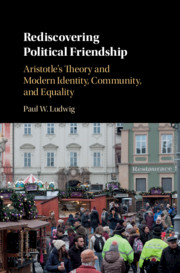Book contents
- Rediscovering Political Friendship
- Rediscovering Political Friendship
- Copyright page
- Dedication
- Epigraph
- Contents
- Preface and Acknowledgments
- Introduction
- Part I Foundations of Friendship
- Part II Where Is Civic Friendship Today?
- Part III A Different Way to View Liberalism
- 5 From Communitarianism to Civic Friendship
- 6 Commercial Society and Civic Friendship
- 7 Mass Society and Civic Friendship
- Part IV Conclusion
- Works Cited
- Index
5 - From Communitarianism to Civic Friendship
Broadening Out beyond Associations
from Part III - A Different Way to View Liberalism
Published online by Cambridge University Press: 12 December 2019
- Rediscovering Political Friendship
- Rediscovering Political Friendship
- Copyright page
- Dedication
- Epigraph
- Contents
- Preface and Acknowledgments
- Introduction
- Part I Foundations of Friendship
- Part II Where Is Civic Friendship Today?
- Part III A Different Way to View Liberalism
- 5 From Communitarianism to Civic Friendship
- 6 Commercial Society and Civic Friendship
- 7 Mass Society and Civic Friendship
- Part IV Conclusion
- Works Cited
- Index
Summary
Theorists of community cling to one form of civic friendship—associations—as if no society-wide friendship could exist. Small groups may be friendlier, but they fall short of being truly civic when they fail to guarantee individual rights. John Locke’s liberalism is safer because it bases rights on property. Locke’s theory is also descriptively accurate because it still operates today, under cover of newer theories, for example in the beliefs of electoral majorities that earners deserve to keep the fruits of their labor and that “paying one’s own way” is dignified. Yet communitarians are correct that property rights obscure civic friendship. Aristotle’s psychology of commercial exchange builds on Lockean property, showing how money is a marker for honor, the civic analogue of love. Societies in which workers are paid a fair wage are friendly societies; where this does not occur, society is full of malcontents. Workers feel dishonored by low pay. Similarly, societies that honor civic patrons enjoy a concord that is like friendship; where public service is not honored, the wealthy desire revolution, according to Aristotle. Money and honor tie citizens to the larger society.
Keywords
- Type
- Chapter
- Information
- Rediscovering Political FriendshipAristotle's Theory and Modern Identity, Community, and Equality, pp. 191 - 221Publisher: Cambridge University PressPrint publication year: 2020

